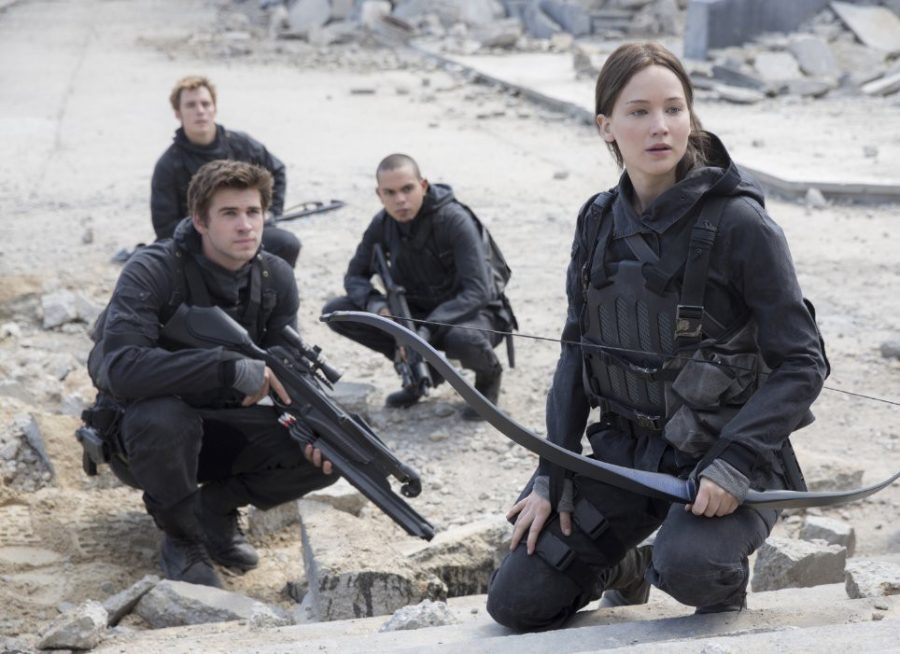The premier young adult dystopian franchise comes to a bombastic and sobering finale in “The Hunger Games: Mockingjay – Part 2,” rounding out the series with an impressive tonal and thematic consistency.
Apart from ending the series, this final film marks the beginning of the waning period of the entire YA film phenomenon.
This second-half installment picks up immediately after its first half; Katniss Everdeen’s (Jennifer Lawrence) neck is still a bruised, splotchy purple from an assassination attempt at the hands of her best friend, Peeta Mellark (Josh Hutcherson). The Capitol, the totalitarian government run by the ever-grinning President Snow (Donald Sutherland), commandeered Peeta’s mind through fear conditioning, turning him into a weapon to kill figurehead Everdeen (referred to as the “Mockingjay”) and derail the revolution that is in full swing.
Just as “Harry Potter and the Deathly Hallows – Part 2,” the film that begat the money-grabbing, clunkily-titled ‘Part 2’ pattern, promised and delivered on the ultimate final battle of Hogwarts, “Mockingjay – Part 2” culminates in the assault on the Capitol.
Katniss, Peeta, hometown crush Gale Hawthorne (Liam Hemsworth) and a small company of rebels pick their way through the city, which has been booby-trapped with flamethrowers, turret guns and bizarre eyeless, slimy mutants that seemed pretty out of place.
And, just like the final “Potter” film, the heart-breaking deaths are aplenty. This is a grim film, with teenagers meeting grisly fates.
The various revelations largely hit their marks.
There’s a particular sequence toward the end of the film—where Katniss has volunteered to serve as executioner—which turns on the point of one of Katniss’ endless arrows. She has the quill on lease from Legolas, probably.
Lawrence has had to act theatrically distraught a lot throughout this series, and there’s plenty of her looking horrified, open-mouthed, at the death and destruction around her.
But there’s also plenty of what makes Katniss a very compelling, real character, and that is her flawed humanity.
She’s every bit a teenager who has been tasked with becoming a living myth; she gets worn out, has doubts and, sometimes, just gets tired of having to give a damn so much. Yet, she persists on.
The love triangle between Katniss, Peeta and Gale—always something of a footnote throughout the series, seemingly added out of necessity due to the “Twilight” love triangle bonanza—finally comes to the forefront here.
I didn’t care about it anymore, though. Katniss finding love never seemed like a major concern to the movie or, honestly, to her.
I watched the previous three films in the days leading up to watching the last. When viewed in close succession, it’s apparent that the series successfully maintains its tones and themes over the span of four films.
For example, Peeta briefly mentions in the first film that he doesn’t want to lose himself and, by this final installment, he’s almost literally possessed by his enemy.
It’s a tall accomplishment to maintain consistency, especially in terms of overall quality, and, although there are some peaks (“Catching Fire”) and valleys (“Mockingjay – Part 1”), they are much closer together than I had originally thought.
With “The Hunger Games” bowing out, there are only two blockbuster series comprised of YA fiction adaptations remaining: the Shailene Woodley-starring “Divergent” series and “The Maze Runner” series, both of which started in 2014. While some would say that two is more than enough and that we’re now out of the thick of it, three such series haven’t run concurrently before, and it doesn’t look like they will going forward either.
Indeed, the YA epidemic, which had a ubiquity to rival the silver-screen superhero film as well as Hot Topic, will quietly run its course.
“Divergent” and “Insurgent” both opened to around $50 million box offices, while the two “Maze Runner” films both netted approximately $30 million during their initial weekends.
While those takes aren’t anything to sneeze at, this “Hunger Games” finale opened to $100 million and even that was the runt of the series.
There was post-Harry Potter, post-Twilight and now we are post-Hunger Games. (I know it’s a stretch to label The Boy Wizard global phenomenon as YA, but bear with me.)
No matter how fresh I thought the first “Maze Runner” film was, the waiting-in-line-opening-night, clamoring fervor is gone. “Post-Divergent” isn’t ever going to be a term you hear.
I’ll miss Katniss Everdeen and her flaws, foibles and dogged, begrudging determination. But the Girl on Fire needs a rest.
She, and the series, have earned it.
The Hunger Games series
B+
Follow Alex Guyton on Twitter.









